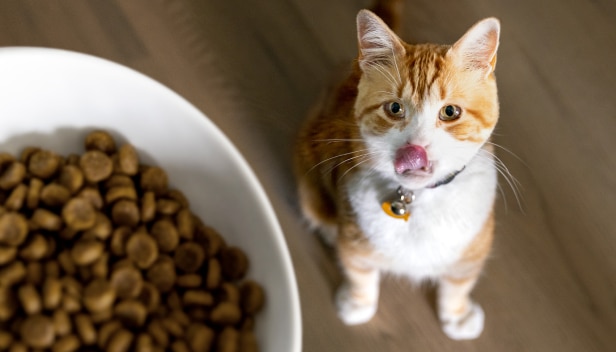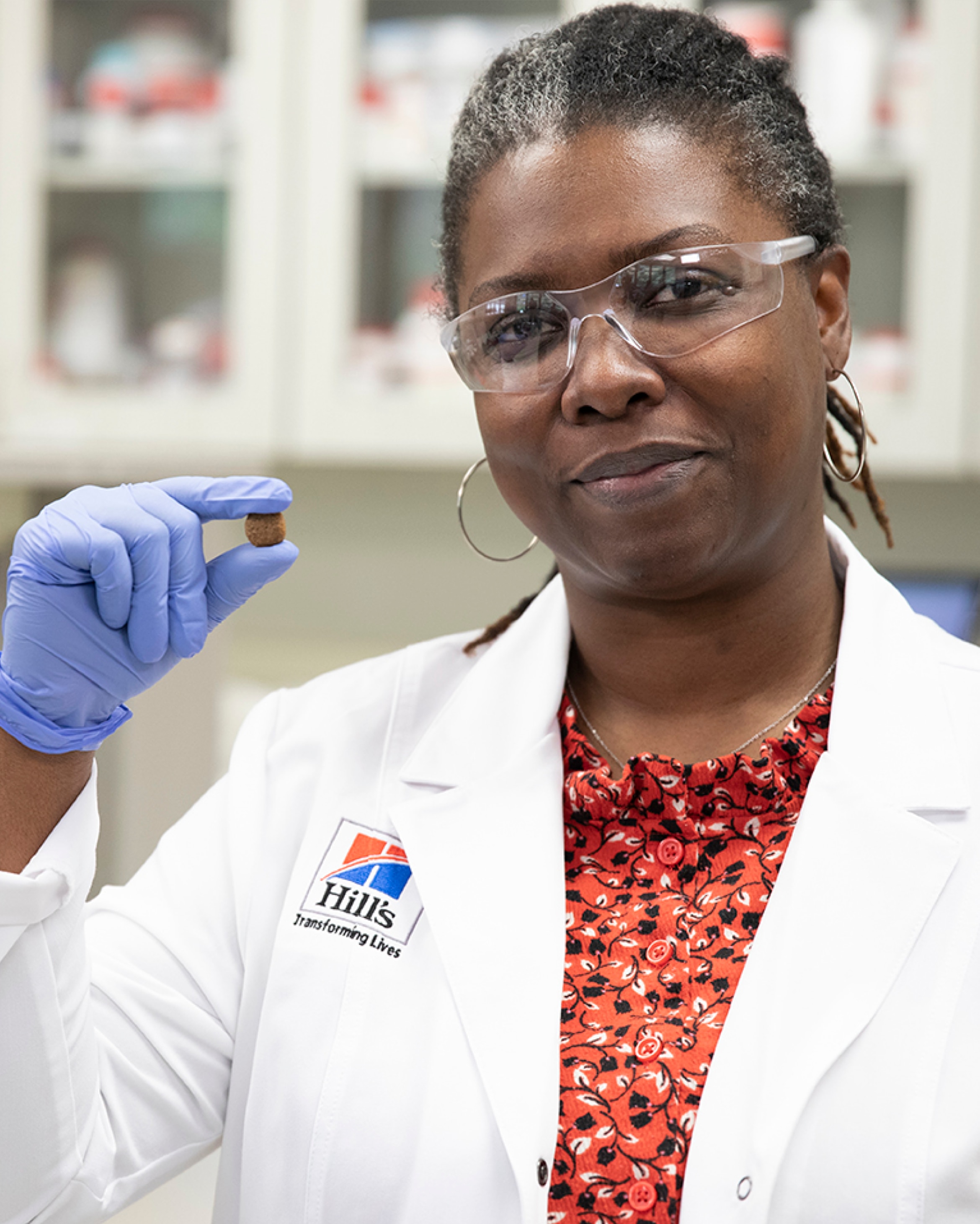
-
Find the right food for your petTake this quiz to see which food may be the best for your furry friend.Find the right food for your petTake this quiz to see which food may be the best for your furry friend.Health CategoryFeatured products
 Hill's Science Diet Adult Healthy Mobility Large Breed Chicken Meal, Barley & Brown Rice Recipe Dog Food
Hill's Science Diet Adult Healthy Mobility Large Breed Chicken Meal, Barley & Brown Rice Recipe Dog FoodAdvanced nutrition shown to support joint health and improve mobility
Shop Now Adult Light Large Breed Chicken Meal & Barley Recipe Dog Food
Adult Light Large Breed Chicken Meal & Barley Recipe Dog FoodFewer calories for less active large breed dogs
Shop Now Adult Large Breed Chicken & Barley Recipe Dog Food
Adult Large Breed Chicken & Barley Recipe Dog FoodSupports healthy joints, lean muscle, and beautiful coat for large breed dogs
Shop NowFeatured products Kitten Healthy Cuisine Tender Chicken & Rice Medley
Kitten Healthy Cuisine Tender Chicken & Rice MedleyDelicious tender chicken and rice in a mouthwatering sauce with precisely balanced nutrition to support 5 essential building blocks for lifelong health
Shop Now Adult Perfect Digestion Chicken, Barley & Whole Oats Recipe Cat Food
Adult Perfect Digestion Chicken, Barley & Whole Oats Recipe Cat FoodHill's Science Diet's breakthrough nutrition supports ultimate digestive well-being & healthy microbiome
Shop Now Adult Oral Care Chicken & Brown Rice Recipe Cat Food
Adult Oral Care Chicken & Brown Rice Recipe Cat FoodClinically proven kibble technology to reduce plaque & tartar build-up
Shop Now -
DogCat
- Cat Tips & Articles
-
Health Category
- Weight
- Skin & Food Sensitivities
- Urinary
- Digestive
- Kidney
- Dental
- Serious Illness
-
Life Stage
- Kitten Nutrition
- Adult Nutrition
Featured articles Cat vs. Dog: Which Is the Best Pet for Me?
Cat vs. Dog: Which Is the Best Pet for Me?Learn about important differences between dogs and cats, such as cost & space considerations. These factors can help you decide which pet is best for you.
Read More Fun Ideas for Kids and Pets This Summer
Fun Ideas for Kids and Pets This SummerOutdoor summer activities with your dog or cat can be fun for kids, too. Learn how they also teach kids responsibility & creates a bond with their pet.
Read More Adopting a Pet: What You Need to Know
Adopting a Pet: What You Need to KnowLearn the basics of adopting a pet, including where to begin and common questions you should ask yourself when deciding which kind of pet is best for you.
Read More -
Food sensitivities in cats
Food sensitivities in cats
Does your cat have signs of food sensitivities?
If a cat vomits frequently, has diarrhoea, irritated skin, a poor coat condition or hair loss, then they may have food sensitivities. The most common symptoms are digestive upset or skin irritation. These signs can be long-term, recurring and should be noted to your vet.














What causes sensitivities in cats?
One of the most difficult things on a cat’s path to recovery is determining what is causing their sensitivities. Food sensitivities in cats are caused by a reaction to a particular ingredient, usually a protein. Food sensitivities may last a lifetime so the ingredient must be permanently removed from your cat’s diet.
What causes sensitivities in cats?
One of the most difficult things on a cat’s path to recovery is determining what is causing their sensitivities. Food sensitivities in cats are caused by a reaction to a particular ingredient, usually a protein. Food sensitivities may last a lifetime so the ingredient must be permanently removed from your cat’s diet.


Environmental sensitivities
A cat may react to certain substances in their environment — like grass, pollen, mold or biting insects. Removing the offending allergen along with a multimodal approach can help reduce the adverse signs of environmental sensitivities in cats.


Food sensitivities
Cats may experience reactions to certain ingredients, and they are identified through food elimination trials conducted by your veterinarian. A food elimination trial is a process of finding and removing the food ingredient causing skin issues or digestive upsets. Luckily, food sensitivities are uncommon in cats.
Managing a cat’s sensitivities
Managing a cat’s sensitivities can be a challenging process, and your first step should be visiting your veterinarian. They will help you find the right combination of nutrition, medication, and/or topicals for your cat.


Trust
Living with a cat with food sensitivities can cause you both to be restless, but the road to recovery will require time, patience and trust in your vet. Remember — just like humans, every cat is unique, and the best solution will come from working with a professional to address your pet’s specific needs. Together, you’ll get on the right track to helping your best friend feel like their best self.
Cats may experience reactions to certain ingredients, and they are identified through food elimination trials conducted by your veterinarian. A food elimination trial is a process of finding and removing the food ingredient causing skin issues or digestive upsets. Luckily, food sensitivities are uncommon in cats.


Nutrition
Therapeutic nutrition plays an important role in the long-term management of sensitivities in cats. The right nutrition can promote healthy skin from within and help alleviate your cat’s signs quickly and long-term. Even with treatment, some cats may have recurring signs that will require adjustments along the way, and your veterinarian will be a helpful resource in managing your cat’s sensitivities.


Medication
A vet may prescribe medication to help alleviate your cat’s signs of sensitivities. If you are wondering what you can give your cat for sensitivities, only give medication as recommended by your vet.


Topicals
Topicals can be used for managing sensitivities in cats. There are various deliveries for topicals like shampoos, lotions, sprays or ointments. Reach out to your veterinarian to ensure a specific topical is appropriate for your pet’s skin condition and life stage.


Understanding nutritional support for food sensitivities
You’ll want to ask your vet about a few things when it comes to the best cat food for food sensitivities. Ask about therapeutic cat food with hydrolysed protein that is unlikely to cause a reaction.


Time to see a veterinarian?
If you notice behaviour changes or sense something is off with your cat, it may be time to schedule a vet visit.
You also may want to ask your vet if therapeutic nutrition would be appropriate for your dog. Hill's Prescription Diet foods are developed by a team of Ph.D. nutritionists and veterinarians, and require a vet recommendation for purchase. Schedule an appointment so your vet can assess your pet's health and nutritional needs.
Talk to your vet about which nutrition is right for your pet.

Therapeutic cat nutrition with hydrolysed proteins to help reduce scratching, itching and digestive issues caused by adverse food reactions.

Hill’s Prescription Diet i/d Dry Adult Cat Food is highly digestible, great-tasting nutrition, clinically shown to help manage digestive upsets. Made with chicken for a delicious taste. It’s formulated with Hill’s breakthrough ActivBiome+ Digestion, a proprietary blend of prebiotic fibers, clinically shown to rapidly activate the gut microbiome to support digestive health and overall well-being.

Therapeutic cat nutrition with hydrolysed proteins to help reduce scratching, itching and digestive issues caused by adverse food reactions.

Hill’s Prescription Diet i/d Dry Kitten Food is highly digestible, great-tasting nutrition, formulated to help manage digestive upsets. Made with chicken for a delicious taste. It’s formulated with Hill’s breakthrough ActivBiome+ Digestion, a proprietary blend of prebiotic fibers, clinically shown to rapidly activate the gut microbiome to support digestive health and overall well-being.

